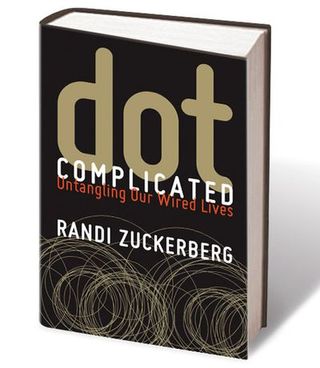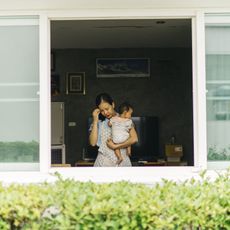My sister Donna is an amazing cook, and last Christmas she was making Peking duck in honor of our family's modern Jewish tradition of eating Chinese food on Christmas. We're all so busy that it's a real treat to get together.
Everyone was gathered in the kitchen, clearing dishes and drinking coffee, while my brother [Facebook founder Mark Zuckerberg] demonstrated the brand-new Poke app that Facebook had launched earlier that week. Through the app, you could send someone a message that would vanish in 10 seconds. We'd all downloaded Poke to try it out. I thought it was funny that here we were, standing around the kitchen counter, everyone looking down at their phones, sending one another messages on Poke. So I snapped a photo of the scene and uploaded it to Facebook.
I knew there was a chance that picture would leak—I never post anything online that I wouldn't feel comfortable being reprinted on the front page of a newspaper. And this photo was the holy grail of tech photos: Facebook family, using Facebook, on Facebook. But I thought surely Christmas was a night when everyone could appreciate our family photo without going, "OMG! Look! I need to blog this!"
About an hour later, I took a quick glance at Twitter and did a double take. Someone had taken the photo and re-posted it. That meant that one of my Facebook friends had seen the photo, downloaded it or taken a screen shot of it, saved it to his or her phone or computer, then uploaded it to a totally different site. I fired off a Twitter response expressing my frustration. Then I went to bed.
The next morning, practically every news station was talking about my Twitter exchange. Obviously people were greatly enjoying the Schadenfreude of a Zuckerberg getting mixed up in anything that had to do with Facebook and privacy. But it really wasn't about that at all. This was about the gray areas of sharing, social conduct, and online etiquette.

I post family photos on Facebook all the time for my friends to see. I see photos of my friends' kids, weddings, and families. None of these photos are private, per se, but they are certainly personal, which means my friends trust me to behave appropriately when I see them. It's generally pretty easy to identify information as either public or private. But when it comes to personal information—that middle ground between something that's OK to share slightly outside your immediate circle but not with absolutely everyone—you enter a bit of a gray zone.
Did you ever wonder why, in movies about the Old West, despite how hot it must have been, the frontier folk wore heavy suits and always spoke in a kind of flowery, polite way? It wasn't just because it was fashionable—this kind of behavior played an important role in maintaining order in a strange new environment.
Stay In The Know
Marie Claire email subscribers get intel on fashion and beauty trends, hot-off-the-press celebrity news, and more. Sign up here.
The Internet is the latest technological improvement bringing us into unfamiliar territory, and as with previous frontiers, we're going to need to grasp something that our parents, our teachers, and our communities probably spent a great deal of time instilling in us as we grew up, something known simply, for lack of a better word, as etiquette.
Even though so much about the way we communicate has changed, certain basic rules of decency and civility haven't and, in fact, may be needed now more than ever. In other words: Re-post unto others as you would have them re-post unto you.
Excerpted from Dot Complicated: Untangling Our Wired Lives by Randi Zuckerberg (HarperOne), due out this month.
-
 21 Spring Essentials in Madewell, Banana Republic, and Shopbop's Flash Sales
21 Spring Essentials in Madewell, Banana Republic, and Shopbop's Flash SalesDon’t let these can’t-miss sales pass you by.
By Brooke Knappenberger Published
-
 'Shōgun' Is a Masterpiece—Will There Be More Episodes?
'Shōgun' Is a Masterpiece—Will There Be More Episodes?With those ratings, never say never.
By Quinci LeGardye Published
-
 32 Child Stars Who Have Aged Like Fine Wine
32 Child Stars Who Have Aged Like Fine WineThey made the notoriously bumpy transition to adulthood look easy.
By Katherine J. Igoe Published
-
 36 Ways Women Still Aren't Equal to Men
36 Ways Women Still Aren't Equal to MenIt's just one of the many ways women still aren't equal to men.
By Brooke Knappenberger Last updated
-
 EMILY's List President Laphonza Butler Has Big Plans for the Organization
EMILY's List President Laphonza Butler Has Big Plans for the OrganizationUnder Butler's leadership, the largest resource for women in politics aims to expand Black political power and become more accessible for candidates across the nation.
By Rachel Epstein Published
-
 Want to Fight for Abortion Rights in Texas? Raise Your Voice to State Legislators
Want to Fight for Abortion Rights in Texas? Raise Your Voice to State LegislatorsEmily Cain, executive director of EMILY's List and and former Minority Leader in Maine, says that to stop the assault on reproductive rights, we need to start demanding more from our state legislatures.
By Emily Cain Published
-
 Your Abortion Questions, Answered
Your Abortion Questions, AnsweredHere, MC debunks common abortion myths you may be increasingly hearing since Texas' near-total abortion ban went into effect.
By Rachel Epstein Published
-
 The Future of Afghan Women and Girls Depends on What We Do Next
The Future of Afghan Women and Girls Depends on What We Do NextBetween the U.S. occupation and the Taliban, supporting resettlement for Afghan women and vulnerable individuals is long overdue.
By Rona Akbari Published
-
 How to Help Afghanistan Refugees and Those Who Need Aid
How to Help Afghanistan Refugees and Those Who Need AidWith the situation rapidly evolving, organizations are desperate for help.
By Katherine J. Igoe Published
-
 It’s Time to Give Domestic Workers the Protections They Deserve
It’s Time to Give Domestic Workers the Protections They DeserveThe National Domestic Workers Bill of Rights, reintroduced today, would establish a new set of standards for the people who work in our homes and take a vital step towards racial and gender equity.
By Ai-jen Poo Published
-
 The Biden Administration Announced It Will Remove the Hyde Amendment
The Biden Administration Announced It Will Remove the Hyde AmendmentThe pledge was just one of many gender equity commitments made by the administration, including the creation of the first U.S. National Action Plan on Gender-Based Violence.
By Megan DiTrolio Published